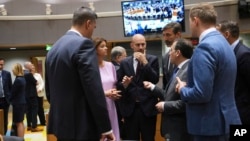A day after the NATO summit in The Hague ends, EU leaders will take the short journey south to Brussels for their regular summer European Council.
Kicking off on the morning of June 26, this summit may continue into the next day as there are plenty of items on the agenda -- most notably Iran, where the EU is struggling to stay relevant.
According to the Brussels diplomats I have spoken with, however, the bloc still aims to act as a conduit for potential direct talks between the United States and Tehran.
That said, there are also several key political decisions on the table -- especially concerning Ukraine.
When Poland took over the six-month rotating presidency of the Council of the European Union with much pomp and circumstance at the start of the year, the stated goal was that formal EU accession talks would start with Ukraine and Moldova during the first six months of 2025.
Polish diplomats had even confidently voiced hopes that more than one of the six negotiating clusters would be opened during their chairmanship.
It's fair to say that things have not panned out as expected.
'Last Chance Saloon'
Unanimity is needed for every cluster to be opened, and Hungary has persistently blocked any move to this effect, even conducting a widely criticized consultative referendum on Ukrainian EU membership.
This summit is something of a "last chance saloon" to unblock the situation but few diplomats believe that Hungarian Prime Minister Viktor Orban will give it much thought.
Some think that maybe things will get moving on this issue after the summit in July when Denmark takes over the presidency.
However, since this has increasingly become a domestic political issue in Hungary, most believe Budapest will continue vetoing progress until the country's parliamentary elections in April 2026.
As regards Ukraine and Moldova, the draft summit declaration seen by RFE/RL states that "the European Council looks forward to the next steps in the accession process in line with the merit-based approach, with clusters being opened when the conditions are met."
The key question now is whether Ukraine and Moldova should be separated in the accession process, as none of the 27 EU member states appear opposed to allowing Chisinau to proceed.
Several member states, however, are reluctant to green-light this "decoupling" as they don't want to "succumb to Hungarian blackmail" as they put it, and believe that the pair should continue together on the road to membership.
A Carrot For Moldova
On the other hand, the EU also wants to give Moldova a carrot, with the first-ever EU-Moldova summit in early July and what are expected to be tightly fought parliamentary elections in September.
The most likely scenario, however, is that all preparatory work on the accession talks will continue in the hope that every cluster can be opened once there is approval from everyone.
For now, the most likely candidate to show concrete progress at the end of June is Montenegro, which is expected to close a cluster of chapters on June 27.
So much for the "EU enlargement momentum" eurocrats have so often keenly propagated in previous years.
If there is one area where Hungary -- and increasingly Slovakia -- may be more willing to move forward, it is on sanctions against Russia.
And there are two decisions to be taken on sanctions: the newly proposed 18th round of restrictive measures and the six-month rollover of all sanctions imposed on the Kremlin since the full-scale invasion of Ukraine nearly three years ago.
Quid Pro Quo?
Several European diplomats have indicated that there might be something of a quid pro quo during the summit, whereby both sanctions decisions will be adopted, but it will be generally accepted that Ukraine cannot move forward on the accession path for now.
For most officials, the most important thing is to get an extension of all the previous sanctions.
This includes all frozen Russian assets in the bloc, totaling over 200 billion euros ($230 billion).
Hungary was toying with the idea of not a giving thumbs-up to the prolongation last time around in January, but officials think that it won't be too dramatic this time, with Russia's increased attacks on Ukrainian civilian targets making any calls for potential peace talks moot.
The fact that the actual deadline for the extension isn't till the end of July means most people RFE/RL has spoken are confident that something can be worked out.
For the 18th sanctions package, most things have been agreed on a diplomatic level already.
This is not too surprising, as most of the blacklistings and proposals -- such as de-SWIFTing Russian banks and sanctioning Nord Stream 1 and 2 -- have been relatively uncontroversial.
Quick approval is also more likely now that the headline proposal to lower the Russian oil price cap from $60 to $45 per barrel appears unlikely to gain traction.
The United States didn't get onboard with this idea at the recent Group of Seven summit, and few believe that the EU -- even with potential political support from allies such as Britain and Canada -- is willing or able to lower the cap without Washington.











